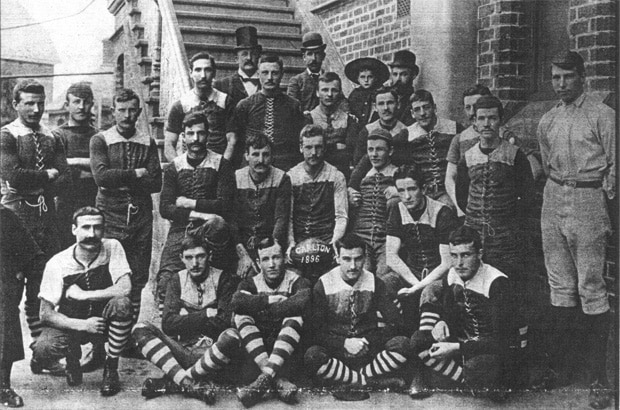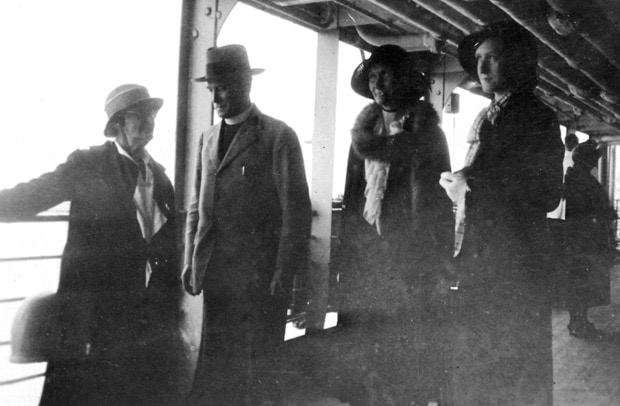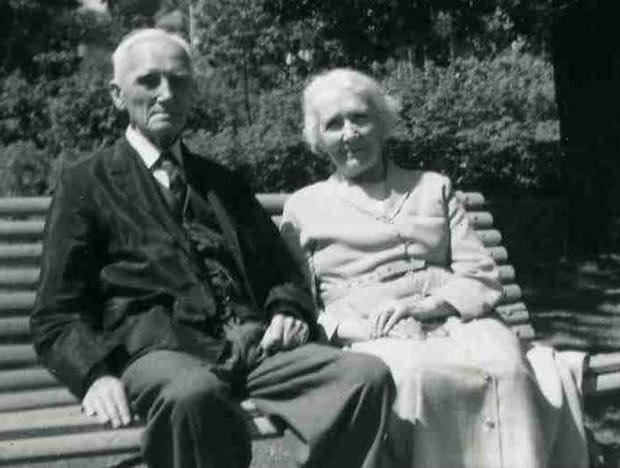"His career will be over soon
And the rituals of a Saturday afternoon
Bid him a reluctant farewell
For he knows beyond the sport lies the spiritual"
Billy Bragg's lyrics for the song God's Footballer, in part tell the whole of the story of the former Wolverhampton striker Peter Knowles, who voluntarily gave the game away after becoming a Jehovah's Witness.
And yet the words could so easily apply to "Brook" Hannah, a one-time Carlton footballer who dedicated 60 years of his life - not to the Jehovah's Witnesses, but as an ordained Christian Minister with the China Inland Mission – and whose extraordinary career can now be detailed for the first time.
This story came to light after this reporter recently met with Andy Hannah, a Melbourne resident who can claim Brook as his great uncle. It was during the handover of the club's commemorative 150th year player badge (numbered 0011 as Brook was the 11th Carlton player to complete his senior debut) that Andy graciously offered an insight into the life and times of old Brook.
Brook, he said, boasted an inherent Hannah trait. "Put simply, the family was driven. It had a purpose," said Andy.
Charles Brooking Hannah was born in the hilly northern Melbourne suburb of Heidelberg some 140 years ago, on September 28, 1874, to William Hannah sen. and Polly Lewis, the daughter of William Richard Lewis the proprietor of Heidelberg's famed Old England Hotel. Brook was the youngest of four children after Alys, William and Horace. There is some mystery about what became of Brook's father, but it was said that after he became estranged from his family and supposedly sailed to New Zealand, his next of kin were raised in the Hotel itself.
The Hannah family home, "Llanellan" (which takes its name from a township in Wales) and the neighbouring "Llanovar" (built by oldest brother William) flanked the site of what is now the Austin Hospital. Llanellan, a grand weatherboard with wide verandahs down three sides, is long gone, but the neighbouring parkland was donated by the Hannah family to the City of Heidelberg and a bronze plaque affixed to a stone bolder on that site confirms as much.
While neither Andy nor other Hannah family descendants can shed any real light on Brook's on-field career, The Blueseum website records his path to Princes Park as via the resident football team at Melbourne University (where he studied law), Carlton reserves and Fitzroy. The Blueseum also has Brook down for a goal on debut for the Maroons, ironically against Carlton, in an Association match played on Saturday, July 15, 1893.
Brook is accredited with at least 37 VFA games and a further 14 for Carlton in the VFL - the first of them against his former club Fitzroy - in the opening round of the League competition's maiden season on Saturday, May 8, 1897.

Carlton team 1896 - According to his surviving niece, Brook is believed to be the player seated in the middle row with the cap who is turning slightly away from the camera. (Photo: Carlton Football Club)
Brook followed Carlton's first League captain Jimmy Aitken down the race and onto Brunswick Street Oval that afternoon and though the visitors ended the match 33 points to the bad, he was considered amongst the best players afield.
Alternating between the wing, midfield and the forward flanks, Brook made a real impression through that historic year. In the wake of his team's 22-point loss to Geelong in the fourth round at Corio Oval, The Argus' correspondent wrote;
"There was one consolation for Carlton. Last week I said that the man who could stop McCallum of Geelong, had yet to be discovered. He was found on Saturday, in the lightly-built, unassuming, but unquestionably clever little footballer, Hannah, and Carlton were mightily pleased with his success"
Curiously, Brook's career at Carlton came to a rather abrupt halt when, in the aftermath of a rather lacklustre '97 season he was part of a mass exodus of players.
It was at this point that Brook's life took an amazing turn. Through the influence of Canon Digby Marsh Berry (whose daughter Catherine later married Brook's older brother Horace), Brook resolved to pursue his vocation as an ordained missionary for the China Inland Mission.
Marcus L. Loane, in his book The Story of China Inland Mission, records that in March 1898, Hudson Taylor, founder of the mission, issued a call for "twenty able, earnest and healthy young men" to form "a special Itinerant Missionary Evangelistic Band"; men who would be "willing to consecrate five years of their lives to itinerant work, without thought of marriage or of settling down till their special work is accomplished".
Brook's resolve to further the ideals of Hudson Taylor sent him on a precarious path, for this was the time of the Boxer Rebellion. The rebellion, initiated by the Militia United in Righteousness (Yihetuan) - known in English as the "Boxers" - was motivated by proto-nationalist sentiments and opposition to foreign imperialism and Christianity.
In a two-year reign of terror between 1898 and 1900, the Boxers set out to exterminate all foreigners in China. As a consequence, hundreds of missionaries and Chinese Christians were put to death, with the China Inland Mission alone losing 58 missionaries and 21 children as martyrs.
Back home, fears for Brook's personal safety abounded, as the Mercury & Weekly Courier of July 20, 1900 detailed.
"Some anxiety is expressed by the relatives and numerous friends of Mr. Brooklyn (sic) Hannah, an old Heidelberg boy, who is in China. The gentleman in question (who is a relative of Mrs. S. M. McCallum, of Eaglemont) was some time ago very popular in this district. He was a prominent footballer (ultimately proving one of the best players of the Carlton club) and took a great interest in athleticism and all out-door manly games. Mr. Hannah, we believe, is so far safe from the fury of the Boxers and anti-foreigner fanatics, as he is in the North-Western portion of China, which up to the latest advices, was not taking part in the rebellion and massacring crusade."
Brook did manage to survive and his cause was strengthened with the addition of 933 missionaries through this bleak period. And yet, as an Assistant Superintendent to Bishop Mowll in the Szechwan province, Brook saw the civil chaos that prevailed in the years following the Boxer Rebellion, as the following extract from the China Inland Mission newsletter of March 1921 attests.
MORE PERSECUTION.
Mr. HANNAH, writing on the 3rd December 1920, speaks of continued persecution of the Christians at Yuinyang, in the following words:-
"You will be grieved to hear that another of our Church members at Yuinyang has been done to death by soldiers. He lived in the country at a place called Ch'ü-ma. His house was pillaged and he himself was killed by the SZECHWAN soldiers who retired from Kweifu a fortnight ago. They robbed and killed as they went, and are now causing trouble in Kaihsien city. Since the recent troubles here we have had several new enquirers, both men and women, and the latter especially are giving us encouragement. My wife is much cheered by their interest in the truth."

Charles Brooking Hannah, Minister of Religion, aboard the China-bound steamship Barrabool in 1933. Featured are from left to right May Hannah and her husband Brook, Catherine Hannah (wife of Brook's brother Horace) and her daughter Helen. (Photo: Supplied)
It was in China that Brook met his future wife May, an English-born Missionary. The couple married more than likely around 1904 and May duly gave birth to two sons, David and John.
Tragically, both boys died in infancy, having been amongst the hundreds and thousands to have lost their lives in a cholera epidemic.
Charis Radford, now living on the Sunshine Coast, together with her 91 year-old Aunt Valerie Daunt (the youngest daughter of Brook's older brother Horace and residing in Kilmore), are the only surviving members of the Hannah clan to have met Brook in person. Charis, a granddaughter of Horace, was but a little girl when in 1956 she met Brook and his wife May whilst her family were on missionary furlough from Tanganyika (now Tanzania) in the English town of Tunbridge Wells in western Kent - the place to which Brook and May had retired after Brook had dedicated 60 years of his life as a Missionary.
"I can't remember too much as I was only then seven, but I know that my mother spoke often and affectionately of Brooking and his wife," Charis said.
"When I met them they were both silvery-haired. He was tall (or so it seemed to a child), slender and had the Hannah feature of a strong, jutting jaw.
"They were both retired and quite elderly then. They were a most gracious couple."
Though Charis never knew that her great uncle represented the Carlton Football Club, she was very mindful of Brook's calling. Quoting from an article of 1899 when Brook first set sail for China, Charis went some way to revealing the man's modus operandi - "He (Brook) struck the key of the lifelong joy of missionary service . . . and it was to prove true in the experience of so many of these early missionaries".

Brook and his wife at Tunbridge Wells, England, in 1957. (Photo: Supplied)
Charles Brooking Hannah was 86 years old when he died in Tunbridge Wells on Saturday, January 14, 1961.
For God's footballer, this was a life truly fulfilled. As he said when boarding the ship for the far east all those years before in 1899;
"One word expresses how I feel, and that is Hallelujah!..... From my very conversion, I felt that these words ('Go ye into all the world......') applied to me. God has led me thus far and I can trust Him step by step."


